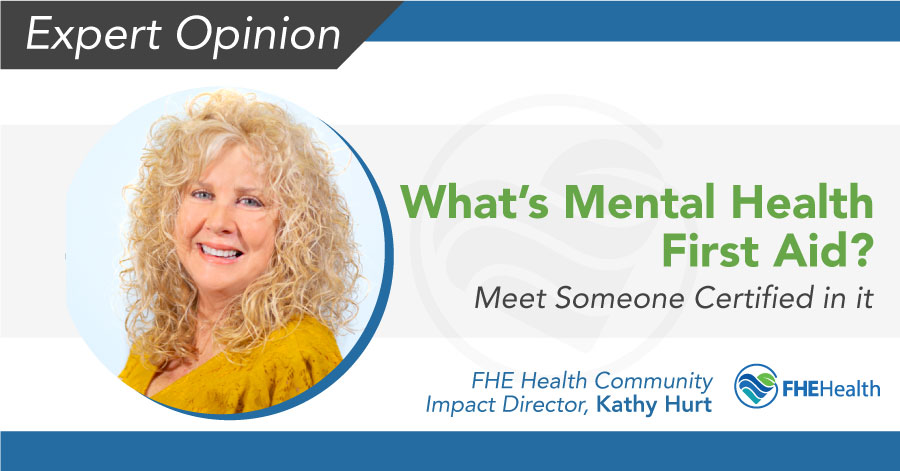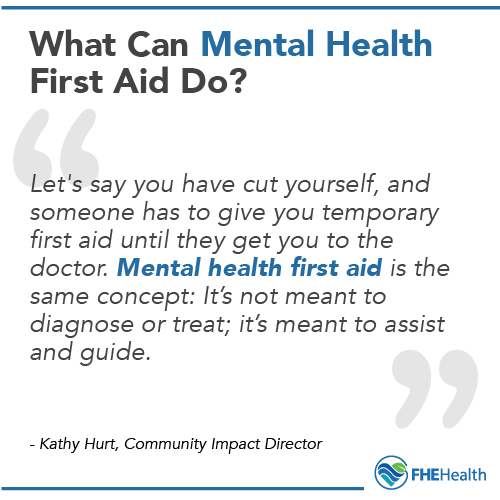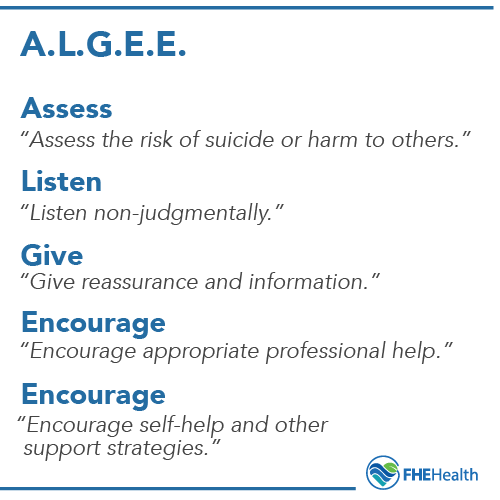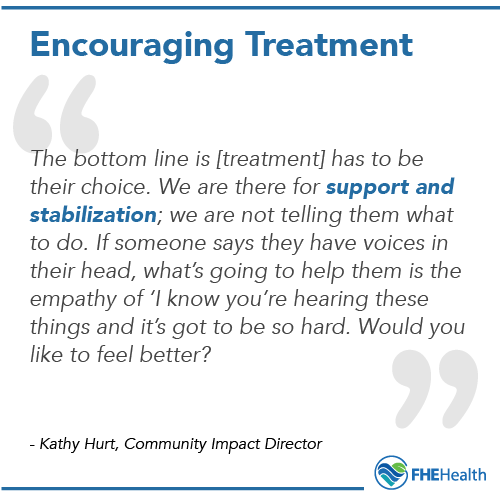
This article has been reviewed for accuracy by our peer review team which includes clinicians and medical professionals. Learn more about our peer review process.
Mental health emergencies happen every day in this country, but it’s not every day that you meet someone certified to give “mental health first aid.” Both the term and what it entails are quite new. After all, in contrast to interventions for other medical health emergencies, such as CPR for heart attacks or the Heimlich maneuver for choking, there isn’t the same level of public knowledge about how to intervene in a life-threatening mental health crisis. When someone is imminently suicidal, for example— what then? When a person with schizophrenia is delusional, hallucinating and their symptoms may be putting them in harm’s way, what is the appropriate emergency response? Many Americans simply don’t know.
Luckily, there is an eight-hour training program, aptly known as “Mental Health First Aid (MHFA),” which is open to anyone interested in learning how to help a loved one with mental illness or anyone else in their care, be they children, youth, college students, veterans and first responders, and/or just the general public. In her role as FHE Health Community Impact Director, our very own Kathy Hurt was trained and certified in the program. In a recent interview, she shared the nuts and bolts of “mental health first aid” and the mental health first aid curriculum, including tips for recognizing signs and symptoms of a mental health crisis….
Why Mental Health First Aid?
 When one in five adults experiences a mental illness in any given year, and one in five youth (ages 13 to 18) will experience “a severe mental health condition at some point in their life,” according to statistics from the National Alliance on Mental Illness (NAMI), there’s a good chance you or someone you love may experience a mental health problem. It’s also very possible, given those statistics, that you may be able to help someone with a mental health problem. Knowing how to intervene can literally save a life.
When one in five adults experiences a mental illness in any given year, and one in five youth (ages 13 to 18) will experience “a severe mental health condition at some point in their life,” according to statistics from the National Alliance on Mental Illness (NAMI), there’s a good chance you or someone you love may experience a mental health problem. It’s also very possible, given those statistics, that you may be able to help someone with a mental health problem. Knowing how to intervene can literally save a life.
On the flip side, not knowing what to do and/or doing the wrong thing in a mental health crisis can “escalate the situation,” Hurt said. Making insensitive remarks or ignoring or downplaying what a person is going through can be a missed opportunity to save a person from harm and even spare their life.
What Is Mental Health First Aid Certification?
For these reasons, having a “mental health first aid kit” of sorts, with steps and a protocol to follow, along with trusted resources to consult, is essential— and not just for first responders who are paid and trained to respond to emergencies. The MHFA certification program equips people with that kit, so they can “triage” a potentially life-threatening mental health issue, Hurt said.
Her explanation: “Let’s say you have cut yourself, and someone has to give you temporary first aid until they get you to the doctor. Mental health first aid is the same concept: It’s not meant to diagnose or treat; it’s meant to assist and guide.”
Hurt, describing her certification and what it is and is not, further explained that “we’re not trained to be negotiators in a crisis situation, but we are trained to assess whether the situation requires a professional.” Moreover, “if the person is at risk for 24 hours, it’s key to get them to a resource like NAMI.”
One Key Acronym to Remember in a Mental Health First Aid Kit
 “ALGEE” is an acronym that trainees in the 8-hour workshop (or alternatively two 4-hour workshops) quickly come to learn and rehearse. The term refers to the recommended plan of action in any mental health crisis. Hurt, who trains people in this process, defined each step as follows:
“ALGEE” is an acronym that trainees in the 8-hour workshop (or alternatively two 4-hour workshops) quickly come to learn and rehearse. The term refers to the recommended plan of action in any mental health crisis. Hurt, who trains people in this process, defined each step as follows:
- A – “Assess the risk of suicide or harm to others.”
- L – “Listen non-judgmentally.”
- G – “Give reassurance and information.”
- E – “Encourage appropriate professional help.”
- E – “Encourage self-help and other support strategies.”
Recognizing Signs of a Mental Health Crisis
The more common scenarios in which this plan of action applies are: when a person seems to be in imminent danger of taking their own life; and when someone may be suffering from severe mental illness symptoms that could jeopardize their physical safety or that of others.
In the first of these scenarios, for example, someone trained in MHFA would know what warning signs to watch for— a key component in assessing the risk of suicide. (Hurt said there is a whole education portion in the training devoted to recognizing these and other mental health signs and symptoms.)
When assessing a person’s risks of suicide, Hurt emphasized that it’s important to look for a change in their behaviors:
 “You might work with the person day in and day out and they’re usually quiet and moody but then all of a sudden are really happy and announce that they want to give their things away. This could be a warning sign that someone is planning suicide. Alternatively, someone else might be usually talkative and happy-go-lucky and then become withdrawn— that’s a warning sign.”
“You might work with the person day in and day out and they’re usually quiet and moody but then all of a sudden are really happy and announce that they want to give their things away. This could be a warning sign that someone is planning suicide. Alternatively, someone else might be usually talkative and happy-go-lucky and then become withdrawn— that’s a warning sign.”
If these behaviors give you good reason to believe the person is in immediate danger of taking their own life, Hurt said “you should notify someone in HR” (if they are a coworker), or “immediately call 911.”
On the other hand, “when you assess for self-harm and it doesn’t look like the person is going to commit suicide, then go to the next step,” Hurt explained, describing how the ALGEE steps work. The next step (L) is listening non-judgmentally. Here Hurt recommended taking the person to coffee. Then, “observe their changes in behavior non-judgmentally and in non-threatening conversation.”
With respect to helping a person in crisis get mental health treatment, Hurt said “the bottom line is [treatment] has to be their choice. We are there for support and stabilization; we are not telling them what to do. If someone says they have voices in their head, what’s going to help them is the empathy of ‘I know you’re hearing these things and it’s got to be so hard. Would you like to feel better?’”
What MHFA Certification Entails and How to Get It
The requirements for MHFA certification can depend on what certification you’re pursuing. Hurt is certified in MHFA public safety and adults, but other certifications may require different components. In Hurt’s case, in addition to the eight hours of training she received, she said the application she completed “was longer than my college application” and required that she write three essays: “It was a whole huge process.”
By the end of that process, though, Hurt had learned:
- how to recognize signs of a mental health crisis;
- and how to triage the situation using an effective plan of action and trusted mental health resources.
“One of the benefits of mental health first aid is that it starts a conversation about mental illness,” Hurt said. “There’s only a very small percentage of people with schizophrenia or bipolar disorder who will do physical harm to others. The MHFA program addresses the stigma and discomfort that still surround mental health issues.”
It’s a conversation that could be life-saving.
For more information about the MHFA program and how to get involved, check out these FAQs. Or, if you or a loved one are considering treatment for a mental health condition, call FHE Health today. Our experienced and compassionate counselors are here 24/7 to answer any questions and help you on your way to full recovery.






